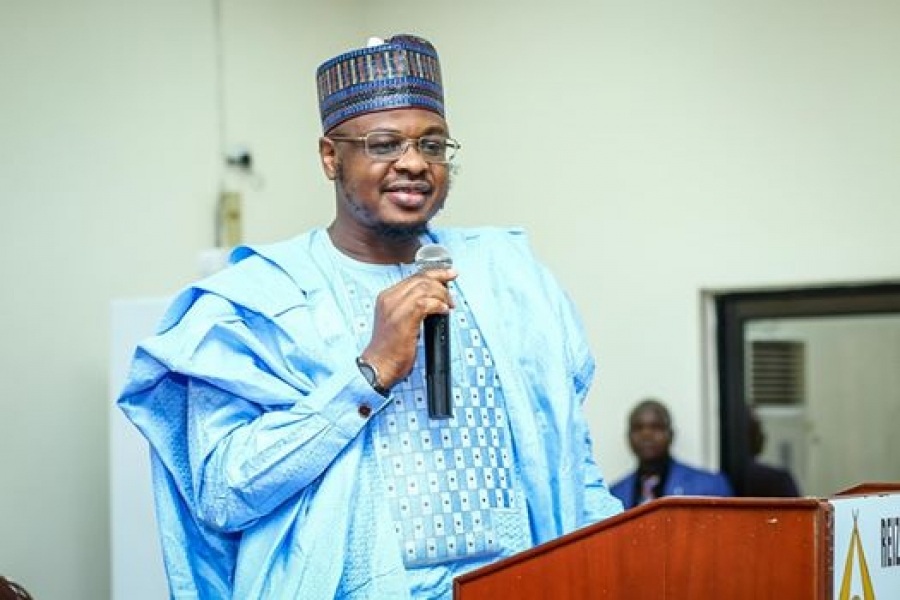Minister of Communications and Digital Economy, Dr Isa Ali Pantami has said that the new reality whereby digital economy is creating opportunities in the emerging world is that digital transformation of Nigeria’s economy has become imperative for sustainable national development.
Declaring open on Tuesday, the 2020 Virtual Information Communication Technology and Telecommunications Conference and Exhibition (ICTEL EXPO 2020) organized by the Lagos Chambers of Commerce and Industry (LCCI) with the theme: “Exploring Opportunity in the Digital Economy,” Pantami said that globally, digital revolution is changing lives and societies with unprecedented speed and scale, delivering immense opportunities as well as associated challenges.
Represented by Mr. Ayuba Shuaibu, Executive Secretary, Universal Service Provision Fund, the minister said that the new reality and lessons learnt from the ‘new normal’ arising from the COVID-19 pandemic makes it mandatory for Nigeria, like other developing countries, to rise up to the challenge, innovate and occupy her place in the global digital economy.
Pantami said that innovations resulting from digital technologies are impacting virtually every sector including retail, transport and logistics, financial services, manufacturing, education, healthcare and broadcasting and warned that now is the time for the country to quicken the alignment of her digital transformation agenda with her economic needs.
“Globally, businesses are shifting from brick and mortar form to innovative enterprises driven by digital technologies. Now is the time for businesses, enterprises and organisations, whether public or private to reinvent and automate to fit into the global digital economy.
“This new reality and lessons learnt from the ‘new normal’ arising from the COVID-19 pandemic makes it mandatory for Nigeria, like other developing countries, to rise up to the challenge, innovate and occupy her place in the global digital economy,” the minister said.
He said that as predicted by the World Economic Forum, over 60% of global Gross Domestic Product (GDP) will be digitised by 2022 and that over the next decade, digital platforms will be used to create close to 70% of new value.
“The role of government, as the driver of the digital economy, cannot be overemphasized especially, in formulation and implementation of national Information and Communication Technology (ICT) policies, as well as sustaining infrastructure.
“Therefore, to actualise our dream of a Digital Nigeria, the redesignated Federal Ministry of Communications and Digital Economy under my watch came up with National Digital Economy Policy and Strategy (NDEPS) (2020-2030), which was unveiled by His Excellency, President Muhammadu Buhari, on the 28th of November, 2019 and the Nigerian National Broadband Plan (NNBP), 2020-2025 on the 19th of March, 2020,” he further said.
Pantami said the NDEPS document is based on the 8 pillars of Developmental Regulation, Digital Literacy and Skills, Solid Infrastructure, Service Infrastructure, Digital Services Development and Promotion, Soft Infrastructure, Digital Society and Emerging Technologies, and Indigenous Content Promotion and Adoption.
The minister noted that the Nigerian National Broadband Plan (NNBP) is designed to deliver data download speeds across Nigeria of a minimum 25Mbps in urban areas, and 10Mbps in rural areas, with effective coverage available to at least 90% of the population by 2025 at a price not more than N390 per 1GB of data, translating to 2% of median income or 1% of minimum wage.
He said that NDEPS and the NNBP also provide opportunities for the private sector to participate in the development of the digital economy.

Earlier in her welcome address, President, Lagos Chamber of Commerce & Industry, Mrs. Toki Mabogunje said there is no better time to explore the opportunities provided by the digital economy than now when every nation is seeking ways to overcome the restrictions imposed by the COVID-19 pandemic.
She said that as nations face dwindling growth, deployment of technology is key to economic recovery and sustainability explaining why today, virtually all sectors leverage ICT for optimal performance.
“This is evident in the financial services sector, where almost all banking transactions are conducted through digital channels; the agricultural sector, where sophisticated technologies such as robots, temperature and moisture sensors, aerial images, and Global Position System (GPS) technology are largely deployed.
“The consumer goods sector where online stores and e-commerce has brought an incredible transformation to retail business; the medical sciences where ICT applications are now being widely used for telemedicine, more precise diagnostics, administrative efficiency and medical research.
“The fact is that ICT has become the backbone of business, government, and personal lives. This automation has made businesses to be more profitable, efficient, safer, and more environmentally friendly,” she said.
Mabogunje noted that Nigeria has witnessed a phenomenal growth in its ICT sector over the past two decades, admitting that the sector remains one of the most resilient sectors of the Nigerian economy even in the face of the COVID-19 Pandemic.
“But there are still enormous potentials yet, untapped. This Expo is one of the major platforms that offer opportunities to unlock these potentials.
“As the foremost private sector body in Nigeria (since 1888), the Lagos Chamber is providing, through this Expo, a credible platform to advance the opportunities and linkages in the World of ICT.
“We are committed to the building of economic and commercial ties across all subsectors and players in the ICT sector. We plan to continuously broaden the horizon and scope of the EXPO over the coming years.
“We see great investment opportunities coming from closer interactions and business integration among ICT players and their customers,” she concluded.

